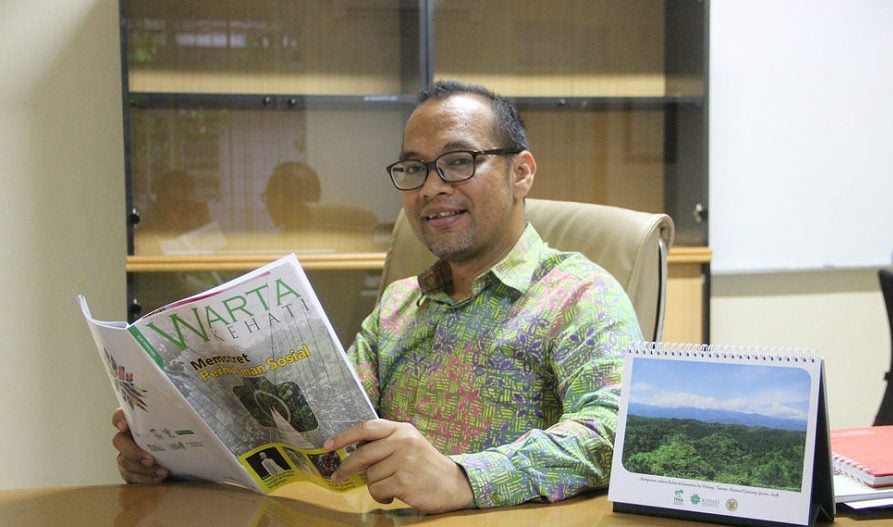Riki Frindos, The New KEHATI Executive Director

-
Date:
30 Apr 2020 -
Author:
KEHATI
DATE: Apr 10, 2018
AUTHOR: KEHATI
Riki Frindos was officially appointed as Executive Director of the Indonesian Biodiversity Foundation (KEHATI) for the 2018-2022 period. The 45-year-old man who has a long career in investment and finance replaces M.S. Sembiring, who managed to lead this institution for eight years, became the leading conservation trust fund (CTF) in Indonesia, managing grants of more than USD 175 million or Rp 2.4 trillion in the last eight years.
Chairman of the KEHATI Foundation Board of Trustees Ismid Hadad, said, the end of the M.S. Sembiring term marks the 25th anniversary of KEHATI’s role in carrying out its mandate as a grant managing agency for the preservation of biodiversity in Indonesia. Success achieved in the previous leadership period is expected to continue following this change, especially amid increasingly severe and complex challenges in the natural resource conservation sector.
“It so happens that the age of the new executive director is relatively young, so we hope that he can become fresh blood for KEHATI’s further work,” Ismid said after the handover ceremony of the KEHATI executive leadership at the KEHATI Foundation Office, Jakarta, Thursday (5/4) .
There are three big challenges according to Ismid in the future of biodiversity conservation work in Indonesia, including KEHATI’s work. First, the escalating pressure on Indonesia’s biodiversity along with the increase of exploitation, deforestation, and climate change, especially in the fields of forestry and the environment. Secondly, the increasingly crucial need for food security and food sovereignty in this country along with the rapid increase in population and decreasing natural carrying capacity which affects food production. Third, the coming political year that will determine the direction of the new government policy, where it needs to be extra-vigilant about short-term political strategy to win the elections / elections.
“Because most of the time, the conservation area and preservation of natural resources becomes an object that is always sacrificed and exploited for the momentary profit of the contestants,” continued Ismid.
In this complex situation, the new KEHATI leader is expected work not just as business as usual and waiting for the government, but he must also be able to advocate for certain policies.
The condition of Indonesia’s biodiversity is still at an alarming level. Tropical rain forests, for example, continue to decrease every year. According to data from the Ministry of Environment and Forestry, from 2010 to 2015, forest loss in Indonesia reached 684,000 hectares annually. This figure placed Indonesia as the country with the highest level of forest loss in the world after Brazil. Meanwhile, awareness of biodiversity conservation is still relatively low, while the implementation of existing policies and regulations is far from satisfying.
On the same occasion, M.S. Sembiring said that he was happy to be able to carry out the mandate given by KEHATI leaders for the past eight years. Substitution of good leadership in this institution indicate a well-planned regeneration process. This good regeneration of KEHATI should be used to increase KEHATI quality and become a world class CTF institution. Some challenges in the future that need attention: improving current achievements so that KEHATI can expand its role in the preservation of Indonesia’s biodiversity through empowering the community.
In addition, as a conservation institution in Indonesia that is in the frontline for implementing one of the principles in the Sustainable Development Goals (SDGs), namely sustainable financing, KEHATI must be able to maintain and enhance cooperation with various parties, especially the business sector. “Nothing should be left behind. Do not leave anything behind to encourage conservation. That is the responsibility of all parties, including the business sector,” added the figure of the Capital Market and Finance former Director of the Indonesia Stock Exchange.
Three important steps
Chairman of the KEHATI Foundation Dr Endang Sukara, explained, there are at least three steps that must be consistently taken in saving biodiversity in Indonesia in the future: protecting and preserving biodiversity, sustainable utilization, and equal distribution of benefits for the welfare of the community.
“These three things must be integrated. In addition, to strengthen the sustainable use of biological diversity, KEHATI will also need to intensify the research in the future. We are still very behind on this compared to other countries. In fact, we are the country with the richest biodiversity in the world, “said the former Deputy Chair of the Indonesian Institute of Sciences (LIPI).
Riki, who for more than 20 years has a career in the financial sector, said, as a new captain, he will learn and try to develop what has gone well at KEHATI towards wider and deeper achievements. His long experience in the financial and investment sectors, he believes, will strengthen efforts to develop this institution. This is because environmental problems cannot be separated from the management of financial and investment funds, especially in the natural resources sector as one of the keys to supporting the progress of Indonesia’s economic development in the future.
KEHATI, said Riki, is different from environmental NGOs in general. In its work, this institution cooperates with the financial and business sectors to achieve the principles of environmentally friendly and sustainability. Through the KEHATI Sustainable and Responsible Investment (SRI) Index, for example, KEHATI bridges or creates a symbiosis of mutualism between the world of conservation and the business sector.
“The investment sector should work not only to pursue personal or corporate profits, but also important to have a vision for the livelihoods of many people and biodiversity sustainability,” he said.
He also believes that his extensive network and relations in the financial and investment sectors will benefit his steps in leading KEHATI. Especially, for two needs. First, strengthening the awareness of business and investment practitioners in adopting environmentally friendly principles. Second, to strengthen the source of funding in order to maintain the continuity of its work in realizing its vision and mission while maintaining the principle of independence.
